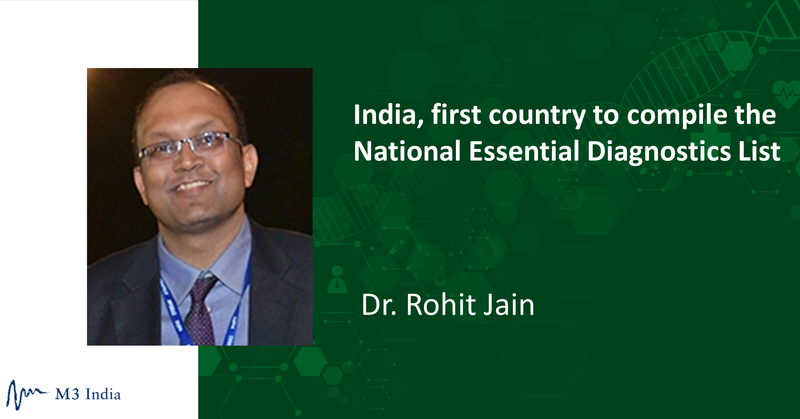India, first country to compile the National Essential Diagnostics List : Dr Rohit Jain
M3 India Newsdesk Sep 13, 2019
Dr. Rohit Jain writes that though India may have become the first country to compile the National Essential Diagnostics List (NEDL), human resource required to carry out the tests still is not as per the law of the land which makes universal health coverage seem like a distant dream now.

In vitro diagnostic medical devices (IVDs) are, in general, pathology tests and related instrumentation used to carry out testing on human samples, where the results are intended to assist in clinical diagnosis or in making decisions concerning clinical management. The World Health Organization (WHO) published the first edition of the Model List of Essential In Vitro Diagnostics (EDL) in May 2018, in recognition that IVDs are an essential component to advance universal health coverage, address health emergencies, and promote healthier populations, which are the three strategic priorities of the WHO Thirteenth General Programme of Work (2019–2023).
Subsequently India has become the first country to compile the National Essential Diagnostics List (NEDL) that would provide guidance to the government for deciding the kind of diagnostic tests that different healthcare facilities in villages and remote areas require.
The increasing expectation for early and accurate diagnosis of disease along with the growing possibilities in personalised medicine has fueled the demand for IVDs. These devices include laboratory or point-of-care devices, calibrators, controls, kits and reagents as well as other accessories which are used to perform diagnostic tests on human samples. IVDs are distinct from medical devices, as they never come into direct contact with the patient however, have an impact on treatment decisions which could be life saving.
With a population of more than 1.33 billion, India is the world's second largest country and is the fourth largest market for IVD in Asia after China, Japan and South Korea, growing at an extraordinary pace. The global IVD market is estimated to reach USD 97.01 Billion, in 2022. In 2014, India held total 1% market share of global IVD market. However, the revenue of the India IVD market has grown at a CAGR of 20% and is expected to double its share to 2% by 2020.
Pathology is the cornerstone of modern medicine, ensuring that patients are correctly diagnosed and given an appropriate treatment. However, a new Series in The Lancet highlights how common presumptive treatment or treatment without a confirmed diagnosis, is likely to be in many low- and middle-income countries as a result of a serious shortage of pathologists, laboratory services and basic medical tests. While the NEDL provides a list of important tests required at various levels of the health care system, it is important to note that the NEDL itself cannot have an impact without an integrated, connected, tiered laboratory system, with adequate human resources, training, laboratory infrastructure, and regulatory/quality assurance systems.
Currently, the Indian healthcare sector specifically with regard to Clinical/Pathological laboratories is completely unregulated.
It has no clear rules for regulating registration, inspection and penalties. Even World Health Organization has recommended as early as in 2003 that India ought to take out a National Health Laboratory Policy to regulate clinical laboratories in India. There is absence of minimum standards for Medical Diagnostic Laboratories viz. human resource in basic laboratories catering to more than 90% population of India; guidelines on sample collection centers; sample transport; usage of scanned/electronic signatures by pathologists; number of laboratories a pathologist ought to be allowed to visit in a day; daily internal quality control and regulation of health insurance claims on the basis of illegal laboratory reports.
There is an absence of any central allied health/paramedical/medical lab technology council as well as data regarding the number of trained medical postgraduates in Pathology, medical lab technicians and institutes offering medical lab technology courses in the Country. All this is leading to Quackery in medical diagnostics with the Government of India turning a deaf ear, putting in jeopardy the lives of billions of Indian citizens and foreigners who visit India for medical tourism. Universal Health coverage with NEDL sans regulations still seems to be a distant dream in India.
Disclaimer- The views and opinions expressed in this article are those of the author's and do not necessarily reflect the official policy or position of M3 India.
The author, Dr. Rohit Jain, is a Consultant Pathologist from Jaipur and the Founder Secretary of Practicing Pathologists Society, Rajasthan. He is also an RTI activist for the patients’ rights in India & Instrumental for policy changes in Pathology practice for the betterment of Healthcare scenario by eradication of rampant “Quackery” in Pathology Practice in India for which he has been included in the Power list 2018 by “The Pathologist” magazine amongst 100 most influential people in Pathology in the world.
-
Exclusive Write-ups & Webinars by KOLs
-
Daily Quiz by specialty
-
Paid Market Research Surveys
-
Case discussions, News & Journals' summaries